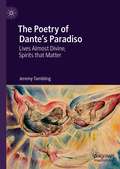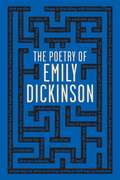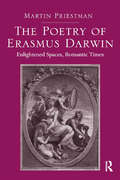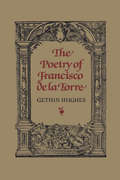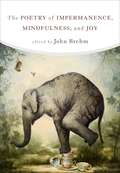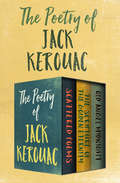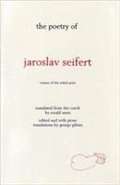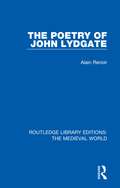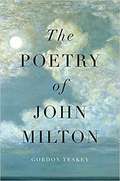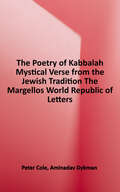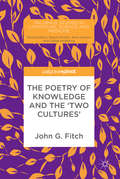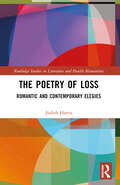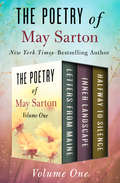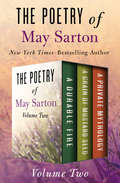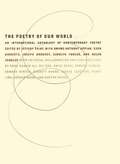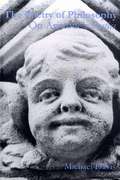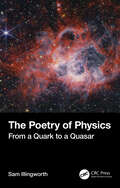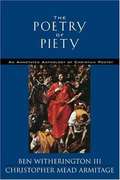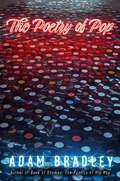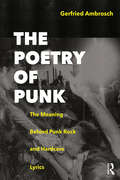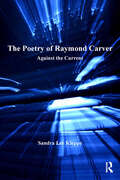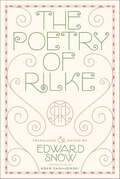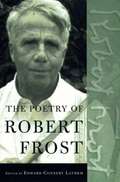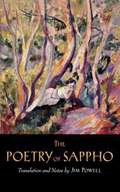- Table View
- List View
The Poetry of Dante's Paradiso: Lives Almost Divine, Spirits that Matter
by Jeremy TamblingThis book argues that Paradiso – Dante’s vision of Heaven – is not simply affirmative. It posits that Paradiso compensates for disappointment rather than fulfils hopes, and where it moves into joy and vision, this also rationalises the experience of exile and the failure of all Dante’s political hopes. The book highlights and addresses a fundamental problem in reading Dante: the assumption that he writes as a Catholic Christian, which can be off-putting and induces an overly theological and partisan reading in some commentary. Accordingly, the study argues that Dante must be read now in a post-Christian modernity. It discusses Dante's Christianity fully, and takes its details as a source of wonder and beauty which need communicating to a modern reader. Yet, the study also argues that we must read for the alterity of Dante’s world from ours.
The Poetry of Emily Dickinson (Wordsworth Classics)
by Emily DickinsonThe Poetry of Emily Dickinson is a collection of pieces by 19th-century American poet Emily Dickinson, who insisted that her life of isolation gave her an introspective and deep connection with the world. As a result, her work parallels her life--misunderstood in its time, but full of depth and imagination, and covering such universal themes as nature, art, friendship, love, society, mortality, and more. During Dickinson’s lifetime, only seven of her poems were published, but after her death, her prolific writings were discovered and shared. With this volume, readers can dive into the now widely respected poetry of Emily Dickinson. Lexile code: NP
The Poetry of Erasmus Darwin: Enlightened Spaces, Romantic Times
by Martin PriestmanWhile historians of science have focused significant attention on Erasmus Darwin’s scientific ideas and milieu, relatively little attention has been paid to Darwin as a literary writer. In The Poetry of Erasmus Darwin: Enlightened Spaces, Romantic Times, Martin Priestman situates Darwin’s three major poems - The Loves of the Plants (1789), The Economy of Vegetation (1791) and The Temple of Nature (1803) - and Darwin himself within a large, polymathic late-Enlightenment network of other scientists, writers, thinkers and social movers and shakers. Interpreting Darwin’s poetry in terms of Darwin’s broader sense of the poetic text as a material space, he posits a significant shift from the Enlightenment’s emphases on conceptual spaces to the Romantic period’s emphases on historical time. He shows how Darwin’s poetry illuminates his stance toward all the major physical sciences and his well-formulated theories of evolution and materially based psychology. Priestman’s study also offers the first substantial accounts of Darwin’s mythological theories and their links to Enlightenment Rosicrucianism and Freemansonry, and of the reading of history that emerges from the fragment-poem The Progress of Society, a first-ever printed edition of which is included in an appendix. Ultimately, Priestman’s book offers readers a sustained account of Darwin’s polymathic Enlightenment worldview and cognate poetics in a period when texts are too often judged by their adherence to a retrospectively constructed ’Romanticism’.
The Poetry of Francisco de la Torre
by John HughesFrancisco de la Torre has long been praised as an outstanding poet in the mould of Garcilaso de la Vega and his simplicity of style and soft, gentle, Arcadian environment of his poetry have been emphasized. In this volume Professor Hughes attempts to define more accurately the position of Francisco de la Torre's verse in the evolution of Spanish poetry in the sixteenth century, revealing that Torre's vision of the pastoral world and his poetic language show him to be a transitional poet of considerable quality and substance and not merely an imitator of Garcilaso. Hughes demonstrates that while some of Torre's poetry follows a general pastoral pattern, his descriptions are characterized by a sense of movement through a shifting perspective and that even in poems with a traditional pastoral setting, the descriptions sometimes negate the pastoral qualities. The author also shows that Torre, rather than looking back towards Garcilaso and his contemporaries, is already anticipating – especially in his stylistic technique and in his view of nature – the attitude of the seventeenth century.
The Poetry of Impermanence, Mindfulness, and Joy
by John BrehmOver 125 poetic companions, from Basho to Billy Collins, Saigyo to Shakespeare.The poems expertly gathered here offer all that one might hope for in spiritual companionship: wisdom, compassion, peacefulness, good humor, and the ability to both absorb and express the deepest human emotions of grief and joy. The book includes a short essay on “Mindful Reading” and a meditation on sound from editor John Brehm—helping readers approach the poems from an experiential, non-analytical perspective and enter into the mindful reading of poetry as a kind of meditation. The Poetry of Impermanence, Mindfulness, and Joy offers a wide-ranging collection of 129 ancient and modern poems unlike any other anthology on bookshelves today. It uniquely places Buddhist poets like Han Shan, Tu Fu, Saigyo, Ryokan, Basho, Issa, and others alongside modern Western poets one would not expect to find in such a collection—poets like Wallace Stevens, Robert Frost, Elizabeth Bishop, William Stafford, Denise Levertov, Jack Gilbert, Ellen Bass, Billy Collins, and more. What these poems have in common, no matter whether they are explicitly Buddhist, is that all reflect the essential truths the Buddha articulated 2,500 years ago. The book provides an important poetic complement to the many prose books on mindfulness practice—the poems here both reflect and embody the dharma in ways that can’t be matched by other modes of writing. It’s unique features include an introduction that discusses the themes of impermanence, mindfulness, and joy and explores the relationship between them. Biographical notes place the poets in historical context and offer quotes and anecdotes to help readers learn about the poets’ lives.
The Poetry of Jack Kerouac: Scattered Poems, The Scripture of the Golden Eternity, and Old Angel Midnight
by Jack KerouacFrom the iconic New York Times–bestselling author of On the Road: Three revolutionary collections of poetry in one volume. Rebelling against the dry rules and literary pretentiousness he perceived in early twentieth-century poetry, Jack Kerouac pioneered a poetic style informed by oral tradition and driven by concrete language with neither embellishment nor abstraction. In these three groundbreaking collections, the legendary Beat writer offers a spontaneous, uncensored perspective on everything from religion to the structure of language itself. Scattered Poems: Bringing together selections from literary journals and his private notebooks, Scattered Poems exemplifies Kerouac&’s innovative approach to language. Populated by hitchhikers, Chinese grocers, Buddhist saints, and cultural figures from Rimbaud to Harpo Marx, the poems evoke the primal and the sublime, the everyday and the metaphysical. The Scripture of the Golden Eternity: During an unexplained fainting spell, Kerouac experienced a flash of enlightenment. A student of Buddhist philosophy, he recognized the experience as &“satori,&” a moment of life-changing epiphany. The knowledge he gained in that instant is expressed in this volume of sixty-six prose poems with language that is both precise and cryptic, mystical and plain. His vision proclaims, &“There are not two of us here, reader and writer, but one golden eternity.&” Old Angel Midnight: A spontaneous writing project in the form of an extended prose poem, this sonorous and spiritually playful book is one of Kerouac&’s most boldly experimental works. Collected from five notebooks dating from 1956 to 1959—a time in which Kerouac was immersed in Buddhist theory—Old Angel Midnight captures the rhythms of the universe and secrets of the subconscious with stunning linguistic dexterity.
The Poetry of Jaroslav Seifert
by Jaroslav Seifert Ewald Osers George GibianThis is the best translated and largest edition of poetry by the Czechs' only Nobel Prize–winning poet, Jaroslav Seifert (he won the prize in 1984 and died in 1986). The poetry is surprising in its simplicity, sensual, thoughtful, moving, comic in turns. Author Milan Kundera has called this collection “the tangible expression of the nation’s genius.”
The Poetry of John Lydgate (Routledge Library Editions: The Medieval World #40)
by Alain RenoirOriginally published in 1967, The Poetry of John Lydgate presents a broad discussion of John Lydgate’s secular poetry. It reassesses much of the poetry through critical examination and suggests that Lydgate was not necessarily the master that the medieval ages proclaimed him to be, nor the plain poet that he is often seen as in modern analysis. Instead, the book suggest that he was a competent poetic craftsman that presents substantial literary form in his poetry. The analysis in the book looks at Lydgate as atypical of the Middle Ages, instead exhibiting traits currently linked to the Renaissance. The book provides a unique perspective on John Lydgate as a poet and will be of interest to medievalist and literary historians alike.
The Poetry of John Milton
by Gordon TeskeyFor sublimity and philosophical grandeur Milton stands almost alone in world literature. His peers are Homer, Virgil, Dante, Wordsworth, and Goethe. Gordon Teskey shows how Milton's aesthetic joins beauty to truth and value to ethics and how he rediscovers the art of poetry as a way of thinking in the world as it is, and for the world as it can be.
The Poetry of Kabbalah: Mystical Verse From The Jewish Tradition
by Peter ColeThe first ever English-language collection of poetry from the Kabbalistic tradition, masterfully translated by MacArthur-winning poet Peter Cole This groundbreaking collection presents for the first time in English a substantial body of poetry that emerges directly from the sublime and often startling world of Jewish mysticism. Taking up Gershom Scholem’s call to plumb the “tremendous poetic potential” concealed in the Kabbalistic tradition, Peter Cole provides dazzling renderings of work composed on three continents over some fifteen hundred years. In addition to the translations and the texts in their original languages, Cole supplies a lively and insightful introduction, along with accessible commentaries to the poems. Aminadav Dykman adds an elegant afterword that places the work in the context of world literature. As a whole, the collection brings readers into the fascinating force field of Kabbalistic verse, where the building blocks of both language and existence itself are unveiled. Excerpts from The Poetry of Kabbalah have been featured in the Paris Review, Poetry, and Conjunctions. “Studded with insight, and written with great verve, this book will become a classic.”―Lawrence Fine, author of Physician of the Soul, Healer of the Cosmos
The Poetry of Knowledge and the 'Two Cultures' (Palgrave Studies in Literature, Science and Medicine)
by John G. FitchThis book argues that poetry is compatible with systematic knowledge including science, and indeed inherent in it; it also discusses particular poems that engage with such knowledge, including those of Lucretius, Vergil, and Vita Sackville-West. The book argues that there are substantial similarities between knowledge-making and poetry-making, for example in their being shaped by language, including metaphor, and in their seeking unity in the world, under the impulse of eros and pleasure. The book also discusses some of the obstacles to a ‘poetry of knowledge’, including scientific objectivism, the Kantian tradition in philosophy, and the separation of the ‘two cultures’ in our academic and intellectual institutions. The book is designed to be accessible to all those interested in the issue of the ‘two cultures’, or in the role of poetry and of science in contemporary culture.
The Poetry of Loss: Romantic and Contemporary Elegies (Routledge Studies in Literature and Health Humanities)
by Judith HarrisThe Poetry of Loss: Romantic and Contemporary Elegies presents a renewed look at elegy as a long-standing tradition in the literature of loss, exploring recent shifts in the continuum of these memorial poems. This volume investigates the tensions arising in elegiac formulations of grief through detailed analyses of seminal poets, including Wordsworth, Keats, and Plath, using psychoanalytic precepts to reconceptualize consolation through poetic strategies of inner representation and what it might mean for personal and collective experiences of loss. Tracing the development of elegy beyond extant readings, this volume addresses contemporary constructs of mourning and their attendant polemics within the wider culture as extensions of elegiac longings and the tendency to refuse consolation and cede to the endlessness of grief. Furthermore, this book concludes that contemporary elegies break with conventions of poetic structure and expression; rather than the poets seeking resolution to grief through compensation, they often find themselves dwelling within the loss rather than externalizing and transcending it. The Poetry of Loss: Romantic and Contemporary Elegies examines these developing psychoanalytic concepts pertaining to a poetics of loss, providing readers with a new appreciation of mourning culture and contemporary attitudes towards grief.
The Poetry of May Sarton Volume One: Letters from Maine, Inner Landscape, and Halfway to Silence
by May SartonThree celebrated volumes of verse from a feminist icon, poet, and author of the groundbreaking novel Mrs. Stevens Hears the Mermaids Singing. Letters from Maine: A rugged coastline provides a stark background for Sarton&’s images of a tragically brief love. With vulnerability and emotional depth, she explores the willingness to devote everything to a new love, as well as the despair at the memory of what is left over when it fades. Inner Landscape: This collection of May Sarton&’s poems displays her inimitable mix of stately verse and depth of feeling that lurks beneath every line, creating a tantalizing, magnetically charged distance between reader and poet. Halfway to Silence: After decades of writing flowing lyric verse, May Sarton&’s style turned to short, vibrant bursts of poetry. These condensed poems are rife with exuberant impressions of nature and of love, including two of her most acclaimed works, &“Old Lovers at the Ballet&” and &“Of the Muse.&” Recognized as a true pioneer in lesbian literature, &“Sarton&’s poems enter and illuminate every natural corner of our lives. . . . So strong in their faith and in their positive response to the human condition that they will outlast much of the fashionable, cynical poetry of our ear&” (James Martin).
The Poetry of May Sarton Volume Two: A Durable Fire, A Grain of Mustard Seed, and A Private Mythology
by May SartonThree compelling volumes of poetry from a feminist icon, poet, and author of the groundbreaking novel Mrs. Stevens Hears the Mermaids Singing.A Durable Fire: This collection borrows its title from Sir Walter Raleigh, who wrote, “Love is a durable fire / In the mind ever burning.” It is a fitting sentiment for a collection on solitude, wherein the author finds herself full of emotion even in seclusion. A Durable Fire is a transformative work by a masterful poet. A Grain of Mustard Seed: In this beautiful collection, Sarton explores dark and destructive femininity. She writes of “Crude power that forges a balance / Between hate and love,” finding an amalgam of dark and light within a single act. These graceful and nuanced poems join timeless ideas and specific moments in history. A Private Mythology: To celebrate her fiftieth birthday, Sarton embarked on a pilgrimage around the world. Traveling through Japan, India, and Greece, she captured her spiritual discoveries in this vivid collection of poetry. Arresting images and meditations on the differences between East and West are rendered in this “colorful, polished” winner of the Emily Clark Balch Prize (Kirkus Reviews).
The Poetry of Our World: An International Anthology of Contemporary Poetry
by Jeffery PainePoets from Africa, Asia, Latin America, Europe, and the English-speaking world are selected by the most distinguished authorities in the field and showcased in this distinctive anthology of poetry from the past 50 years.
The Poetry of Peace
by David KriegerThe poems in this book examine peace from many perspectives. They are filled with the wonder and magic of everyday life. They also express the sorrow and loss that war and violence bring.
The Poetry of Philosophy: On Aristotle's Poetics
by Michael DavisAlthough Aristotle's Poetics is the most frequently read of his works, philosophers and political theorists have, for the most part, left analysis of the text to literary critics and classicists. In this book Michael Davis argues convincingly that in addition to teaching us something about poetry, Poetics contains an understanding of the common structure of human action and human thought that connects it to Aristotle's other writings on politics and morality. Davis demonstrates that the duality of Poetics reaches out to the philosopher, writer, and political theorist and shows the importance of the ideal in our imaginings of and goals for the future.
The Poetry of Physics: From a Quark to a Quasar
by Sam IllingworthThe Poetry of Physics explores the intersection of science and art, blending the intricate beauty of physics with the evocative power of poetry. This unique work takes readers on a journey through the physical world, from the delicate patterns of living organisms to the vast reaches of the cosmos.Structured in four sections – living physics, environmental physics, celestial physics, and a guide on writing your own poems – this book offers both scientific insights and poetic reflections, providing a richer understanding of both fields. The final section provides practical guidance on crafting your own physics-inspired poetry, encouraging active participation in this tradition of blending scientific and artistic inquiry.Ideal for those who appreciate both science and the arts, whether they are physicists, aspiring poets, or curious minds seeking to explore the world and our place within it.
The Poetry of Piety: An Annotated Anthology of Christian Poetry
by Ben Witherington Christopher Mead ArmitagePoetry has always been an elegant, effective means of expression and reflection. With this in mind, Witherington and Armitage have produced this innovative annotated anthology of Christian poetry from the 16th century to the present.
The Poetry of Pop
by Adam BradleyA trailblazing exploration of the poetic power of popular songs, from Tin Pan Alley to the Beatles to Beyonc#65533; and beyond. Encompassing a century of recorded music, this pathbreaking book reveals the poetic artistry of popular songs. Pop songs are music first. They also comprise the most widely disseminated poetic expression of our time. Adam Bradley traces the song lyric across musical genres from early twentieth-century Delta blues to mid-century rock 'n' roll to today's hits. George and Ira Gershwin's "Fascinating Rhythm. " The Rolling Stones' "(I Can't Get No) Satisfaction. " Rihanna's "Diamonds. " These songs are united in their exacting attention to the craft of language and sound. Bradley shows that pop music is a poetry that must be heard more than read, uncovering the rhythms, rhymes, and metaphors expressed in the singing voice. At once a work of musical interpretation, cultural analysis, literary criticism, and personal storytelling, this book illustrates how words and music come together to produce compelling poetry, often where we least expect it.
The Poetry of Punk: The Meaning Behind Punk Rock and Hardcore Lyrics
by Gerfried AmbroschPunk bands have produced an abundance of poetic texts, some crude, some elaborate, in the form of song lyrics. These lyrics are an ideal means by which to trace the developments and explain the conflicts and schisms that have shaped, and continue to shape, punk culture. They can be described as the community’s collective ‘poetic voice,’ and they come in many different forms. Their themes range from romantic love to emotional distress to radical politics. Some songs are intended to entertain, some to express strong feelings, some to provoke, some to spread awareness, and some to foment unrest. Most have an element of confrontation, of kicking against the pricks. Socially and epistemologically, they play a central role in the scene’s internal discourse, shaping communities and individual identities. The Poetry of Punk is an investigation into the Anglophone punk culture, specifically in the UK and the US, where punk originated in the mid-1970s, its focus being on the song lyrics written and performed by punk rock and hardcore artists.
The Poetry of Raymond Carver: Against the Current
by Sandra Lee KleppeBest known as one of the great short story writers of the twentieth century, Raymond Carver also published several volumes of poetry and considered himself as much a poet as a fiction writer. Sandra Lee Kleppe combines comparative analysis with an in-depth examination of Carver’s poems, making a case for the quality of Carver’s poetic output and showing the central role Carver’s pursuit of poetry played in his career as a writer. Carver constructed his own organic literary system of 'autopoetics,' a concept connected to a paradigm shift in our understanding of the inter-relatedness of biological and cultural systems. This idea is seen as informing Carver’s entire production, and a distinguishing feature of Kleppe’s book is its contextualization of Carver’s poetry within the complex literary and scientific systems that influenced his development as a writer. Kleppe addresses the common themes and intertextual links between Carver’s poetry and short story careers, situates Carver’s poetry within the love poem tradition, explores the connections between neurology and poetic memories, and examines Carver’s use of the elegy genre within the context of his terminal illness. Tellingly, Carver’s poetry, which has aroused slight interest among literary scholars, is frequently taught to medical students. This testimony to the interdisciplinary implications of Carver’s work suggests the appropriateness of Kleppe’s culminating discussion of Carver’s work as a bridge between the fields of literature and medicine.
The Poetry of Rilke
by Rainer Maria RilkeA Journey into the Heart of German PoetryExperience a deep dive into the mesmerizing world of one of the most significant poets of the 20th century with The Poetry of Rilke. Uncover an unparalleled collection of Rilke's finest works, elegantly translated over the course of two decades by acclaimed scholar Edward Snow. This collection brings to light over two hundred and fifty of Rilke's distinguished gems, including the complete versions of his towering masterpieces, the Sonnets to Orpheus and Duino Elegies.From his early poetic explorations in The Book of Hours to his visionary verses written in the twilight of his life, this anthology spans the breadth of Rilke's literary evolution. This landmark bilingual edition not only invites you to a breathtaking trip to the heart of lyrical and existential poetry but also serves as a comprehensive platform to appreciate the magical interplay between German and English verses.Alongside Rilke’s works, Snow's enlightening commentaries yield a richer comprehension of Rilke's illustrious verses. The Poetry of Rilke will stand as the authoritative single-volume translation of Rilke into English for years to come.
The Poetry of Robert Frost
by Robert FrostA feast for lovers of American literature--the work of our greatest poet, redesigned and relaunched for a new generation of readers. No poet is more emblematically American than Robert Frost.
The Poetry of Sappho
by SapphoFragments of the poetry of Sappho, Greek poetess who live in 7th century b.c. translated by Jim Powell. Book also includes a brief section on Sappho's life, Notes and and some references
